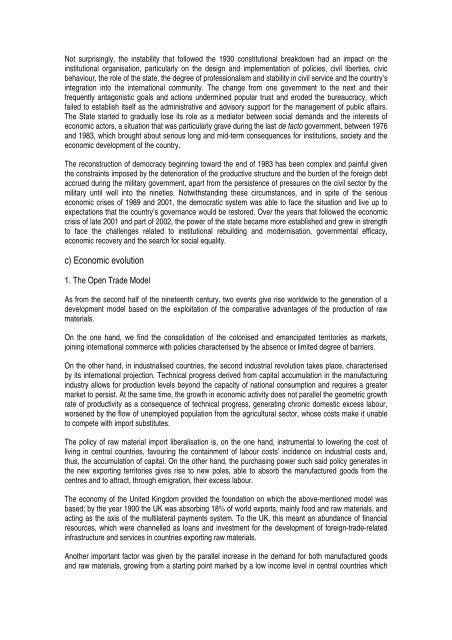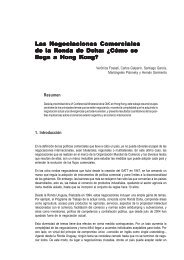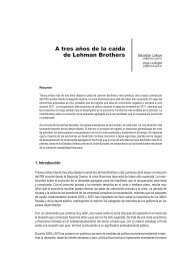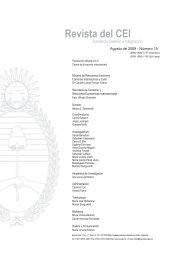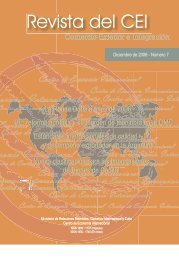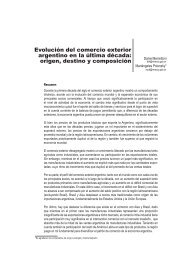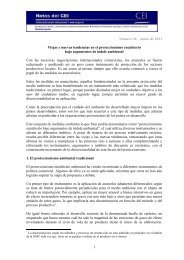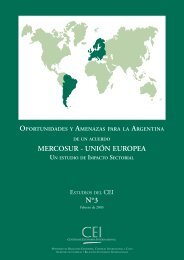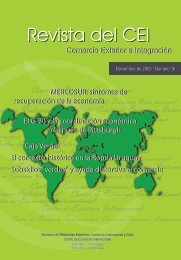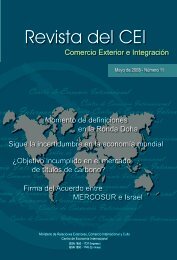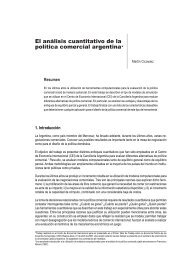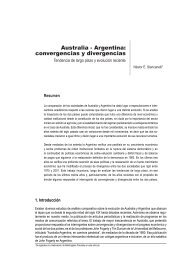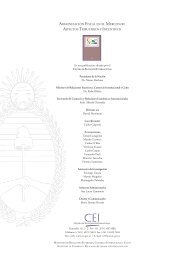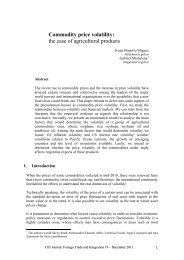Governor-General proposing the person in question (an Australian citizen since the Second World War)for formal ratification by the Crown. The Governor-General’s term of office lasts five years, and they canbe re-elected only once. Apart from assuming protocol duties, they also play a significant role asrepresentatives of the Australian State, and as lea<strong>de</strong>rs of public opinion and consensus building,particularly in view of the major issues affecting society. The party or coalition that obtains the majority inthe House of Representatives, even if they are in a minority in the Senate, makes up the government. It ispresi<strong>de</strong>d by the head of the winning political force, in his/her capacity as the Prime Minister. This PMappoints the cabinet, which has to be ratified by the Governor-General. The House of Representatives isrenewed every three years by a simple majority system, the Prime Minister being entitled to bring forwardthe elections; on the other hand, members of the Senate are elected every six years, by a proportionalrepresentation system, with one-half renewed every three years.Over the 105 years that have passed since the creation of the Parliament, there was only one conflict ofpowers, in 1975, when Governor-General John Kerr <strong>de</strong>ci<strong>de</strong>d to revoke the commission of the Labor PartyPrime Minister Gough Whitlam. The latter had failed to obtain the passing of the budget bill by the Senate,where he was part of the minority. Once the <strong>de</strong>cision was ma<strong>de</strong>, the Governor-General appointed theopposition lea<strong>de</strong>r, the liberal Malcolm Frazer, as caretaker Prime Minister. Immediately after that, he<strong>de</strong>ci<strong>de</strong>d to dissolve the Parliament and call a general election in which the liberal-national coalitionpresi<strong>de</strong>d by Frazer obtained an overwhelming majority.The abovementioned institutional problem led political parties to reach an un<strong>de</strong>rstanding for the futureregarding the Senate passing or not blocking bills relating revenues and expenditures, providing these hadalready been passed by the House of Representatives.The stability of the political system and the British administrative and judicial structure inherited fromcolonial times helped to establish a governmental system and a stable professional bureaucracy whoprovi<strong>de</strong>s it with technical and advisory support and helps implement political <strong>de</strong>cisions. This bureaucracycomprises the entirety of the staff of the ministries and government organisms, works jointly withministerial political cabinets, which are mostly reduced and advise ministers on their legislative duties andin matters of specific political actions of the government.2. ArgentinaArgentina’s experience stems from a different reality. In<strong>de</strong>pen<strong>de</strong>nce was not the result of an evolution butrather the product of political and military confrontation with Spain, which <strong>de</strong>man<strong>de</strong>d all kinds of sacrificesin terms of both human and economic resources. From the very beginning, the new nation was faced withtwo conceptions, a centralising or Unitarian one, hea<strong>de</strong>d by Buenos Aires, and a fe<strong>de</strong>ral one, supportedby most provinces, which espoused different points of view, both on political and economic grounds, giventhe different productive structures and regional comparative advantages. Therefore, it is not surprising thatthe lea<strong>de</strong>rship of Buenos Aires, after severing links to the Spanish metropolis, was regar<strong>de</strong>d withsuspicion from the interior of the country. The differences that existed in the first two <strong>de</strong>ca<strong>de</strong>s afterin<strong>de</strong>pen<strong>de</strong>nce in 1810 were settled by cyclical political and military struggles and later on by a toughdictatorship, which did not end until almost the 1850s. The mo<strong>de</strong>rn institutions of the country actuallystarted with the signing of the San Nicolas Agreement in 1852, the National Constitution in 1853 and theincorporation of the province of Buenos Aires into the new Republic of Argentina in 1870.The selective voting system for the election of the Presi<strong>de</strong>nt, members of the House of Representativesand Senate was abandoned in 1912 with the enactment of the Saenz Peña Law, which established theuniversal male suffrage by secret ballot. This happened more than a <strong>de</strong>ca<strong>de</strong> after the inauguration of theAustralian Parliament and the incorporation of women into the political life of Australia. The constitutionalgovernments in Argentina succee<strong>de</strong>d one another without interruption for 77 years, but in 1930, thiscontinuity was interrupted by a military coup which marked the beginning of a long period of politicalinstability (53 years) marked by frequent coups d’état. The <strong>de</strong> facto governments alternated in power withthe elected ones, who ruled un<strong>de</strong>r the pressure exerted by the military. Women’s right to vote was notgranted until enacted into law by Congress in September 1947.
Not surprisingly, the instability that followed the 1930 constitutional breakdown had an impact on theinstitutional organisation, particularly on the <strong>de</strong>sign and implementation of policies, civil liberties, civicbehaviour, the role of the state, the <strong>de</strong>gree of professionalism and stability in civil service and the country’sintegration into the international community. The change from one government to the next and theirfrequently antagonistic goals and actions un<strong>de</strong>rmined popular trust and ero<strong>de</strong>d the bureaucracy, whichfailed to establish itself as the administrative and advisory support for the management of public affairs.The State started to gradually lose its role as a mediator between social <strong>de</strong>mands and the interests ofeconomic actors, a situation that was particularly grave during the last <strong>de</strong> facto government, between 1976and 1983, which brought about serious long and mid-term consequences for institutions, society and theeconomic <strong>de</strong>velopment of the country.The reconstruction of <strong>de</strong>mocracy beginning toward the end of 1983 has been complex and painful giventhe constraints imposed by the <strong>de</strong>terioration of the productive structure and the bur<strong>de</strong>n of the foreign <strong>de</strong>btaccrued during the military government, apart from the persistence of pressures on the civil sector by themilitary until well into the nineties. Notwithstanding these circumstances, and in spite of the seriouseconomic crises of 1989 and 2001, the <strong>de</strong>mocratic system was able to face the situation and live up toexpectations that the country’s governance would be restored. Over the years that followed the economiccrisis of late 2001 and part of 2002, the power of the state became more established and grew in strengthto face the challenges related to institutional rebuilding and mo<strong>de</strong>rnisation, governmental efficacy,economic recovery and the search for social equality.c) Economic evolution1. The Open Tra<strong>de</strong> Mo<strong><strong>de</strong>l</strong>As from the second half of the nineteenth century, two events give rise worldwi<strong>de</strong> to the generation of a<strong>de</strong>velopment mo<strong><strong>de</strong>l</strong> based on the exploitation of the comparative advantages of the production of rawmaterials.On the one hand, we find the consolidation of the colonised and emancipated territories as markets,joining international commerce with policies characterised by the absence or limited <strong>de</strong>gree of barriers.On the other hand, in industrialised countries, the second industrial revolution takes place, characterisedby its international projection. Technical progress <strong>de</strong>rived from capital accumulation in the manufacturingindustry allows for production levels beyond the capacity of national consumption and requires a greatermarket to persist. At the same time, the growth in economic activity does not parallel the geometric growthrate of productivity as a consequence of technical progress, generating chronic domestic excess labour,worsened by the flow of unemployed population from the agricultural sector, whose costs make it unableto compete with import substitutes.The policy of raw material import liberalisation is, on the one hand, instrumental to lowering the cost ofliving in central countries, favouring the containment of labour costs’ inci<strong>de</strong>nce on industrial costs and,thus, the accumulation of capital. On the other hand, the purchasing power such said policy generates inthe new exporting territories gives rise to new poles, able to absorb the manufactured goods from thecentres and to attract, through emigration, their excess labour.The economy of the United Kingdom provi<strong>de</strong>d the foundation on which the above-mentioned mo<strong><strong>de</strong>l</strong> wasbased; by the year 1900 the UK was absorbing 18% of world exports, mainly food and raw materials, andacting as the axis of the multilateral payments system. To the UK, this meant an abundance of financialresources, which were channelled as loans and investment for the <strong>de</strong>velopment of foreign-tra<strong>de</strong>-relatedinfrastructure and services in countries exporting raw materials.Another important factor was given by the parallel increase in the <strong>de</strong>mand for both manufactured goodsand raw materials, growing from a starting point marked by a low income level in central countries which
- Page 1 and 2:
Revista del CEIComercio Exterior e
- Page 3:
SUMARIOCOYUNTURA COMERCIALEstructur
- Page 7 and 8:
PresentaciónLa sección de coyuntu
- Page 13 and 14:
G r á f i c o 3Diversificación de
- Page 15 and 16:
Las exportaciones de productos prim
- Page 17 and 18:
Relacionado con la evolución que v
- Page 19 and 20:
Vinculado al fuerte crecimiento que
- Page 21 and 22:
Este efecto fue revertido principal
- Page 23 and 24:
Aun así, merecen destacarse al men
- Page 25 and 26:
Cuadro A 1Evolución del saldo de b
- Page 28 and 29:
Cuadro A 4Exportaciones e índice d
- Page 30 and 31:
Cuadro A 6Saldo de balanza comercia
- Page 32 and 33:
las exportaciones en concepto de vi
- Page 34 and 35:
G r á f i c o 3Valor y cambio abso
- Page 36 and 37:
como lo son Egipto, Nigeria, Venezu
- Page 38 and 39:
G r á f i c o 2Crecimiento de las
- Page 40 and 41:
El total exportado también se encu
- Page 42 and 43:
Del Cuadro 1 se desprende una asoci
- Page 44 and 45:
En el primer semestre del año, el
- Page 46 and 47:
Vehículos de navegación aérea, m
- Page 48 and 49:
Unidos. En todos los casos menciona
- Page 50 and 51:
BibliografíaCastagnino, T. (2006).
- Page 52 and 53:
Cuadro A 2G R Á F I C O 1:Exportac
- Page 54 and 55:
Cuadro A 4Exportaciones e índice d
- Page 56 and 57:
Cuadro A 6Saldo de balanza comercia
- Page 58 and 59:
las exportaciones en concepto de vi
- Page 60 and 61:
G r á f i c o 3Valor y cambio abso
- Page 62 and 63:
Se mantiene eldinamismo del BloqueH
- Page 64 and 65:
vez como miembro pleno, en junio tu
- Page 66 and 67:
en el primer semestre del año.Las
- Page 68 and 69:
septiembre del año pasado un baja
- Page 70 and 71:
considera que al cierre del año la
- Page 72 and 73:
dólares norteamericanos, asciende
- Page 74 and 75:
Ambición y equilibrioen la Ronda D
- Page 76 and 77:
3. Resultados mínimos de las conce
- Page 78 and 79:
La aplicación de la propuesta menc
- Page 80 and 81:
4. La ambición y el equilibrio nec
- Page 82 and 83:
El ingreso deVenezuela al Mercosur:
- Page 84 and 85:
A 2006 la estructura arancelaria vi
- Page 86 and 87:
En principio la Argentina participa
- Page 88 and 89:
hubieron otros donde la participaci
- Page 90 and 91:
se puede establecer, según datos d
- Page 92 and 93:
La otra metodología que se utiliza
- Page 94 and 95:
Asimismo, reconoce que la prestaci
- Page 96 and 97:
problema debido a que en el Anexo D
- Page 98 and 99:
Según lo observado en los procesos
- Page 100 and 101:
Trade Facilitation:Definitions, WTO
- Page 102 and 103: se puede establecer, según datos d
- Page 104 and 105: La otra metodología que se utiliza
- Page 106 and 107: Asimismo, reconoce que la prestaci
- Page 108 and 109: problema debido a que en el Anexo D
- Page 110 and 111: Según lo observado en los procesos
- Page 112 and 113: Australia - Argentina:convergencias
- Page 114 and 115: Artículosde 2002 en adelante, por
- Page 116 and 117: Artículosaustraliano), para la rat
- Page 118 and 119: Artículosimportantes inversiones y
- Page 120 and 121: Artículossociales de carácter mod
- Page 122 and 123: Artículospagos de la Administraci
- Page 124 and 125: Artículosmayor libertad de acción
- Page 126 and 127: ArtículosLa disminución del peso
- Page 128 and 129: Artículospor 6.490 millones de dó
- Page 130 and 131: ArtículosLos datos anteriores evid
- Page 132 and 133: ArtículosAustralia a Canberra en 1
- Page 134 and 135: Artículossentaron el 25,0% del tot
- Page 136 and 137: ArtículosBibliografíaAustralian B
- Page 138 and 139: El análisis cuantitativo de lapol
- Page 140 and 141: ArtículosSimulacionesLa metodolog
- Page 142 and 143: Artículoscomo así también insumo
- Page 144 and 145: Artículosdiante la matriz inversa
- Page 146 and 147: ArtículosLas estimaciones realizad
- Page 148 and 149: SummaryAustralia - Argentina:Conver
- Page 150 and 151: evealed by growing political and cu
- Page 154 and 155: enabled a symmetrical growth in the
- Page 156 and 157: 3. Recent EvolutionThe information,
- Page 158 and 159: science and technology. The last es
- Page 160 and 161: Table 5Employment and Unemploymentp
- Page 162 and 163: Table 7High Human Development Index
- Page 164 and 165: It can be stated that Australia has
- Page 166 and 167: 3. Balance of Payments and Foreign
- Page 168 and 169: end of 2006. For the very first tim
- Page 170 and 171: Budget surplus has a counter-cyclic
- Page 172 and 173: plantations, food industries, cold
- Page 174 and 175: The One Thousand Faces ofAgricultur
- Page 176 and 177: A fines de la década de los 50, cu
- Page 178 and 179: estratégicos que efectúan los pa
- Page 180 and 181: subsidios (es más, sólo el 5 por
- Page 182 and 183: de exportar aeronaves y de no afron
- Page 184 and 185: deberíamos suponer que habría una
- Page 186 and 187: tienen jerarquía de tratado intern
- Page 188 and 189: Con el establecimiento de la OMC se
- Page 190 and 191: 3. Para completar el tercer aspecto
- Page 192 and 193: 5 Anexo
- Page 194 and 195: AnexoPIB a precios y tipos de cambi
- Page 196 and 197: AnexoSaldo de la Cuenta Corrienteen
- Page 198 and 199: AnexoTasas de Desempleopromedio anu
- Page 200 and 201: AnexoTasas de inflación (Precios M


